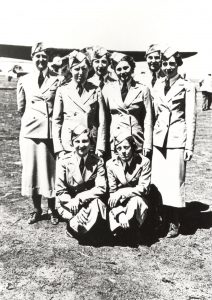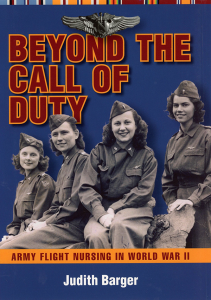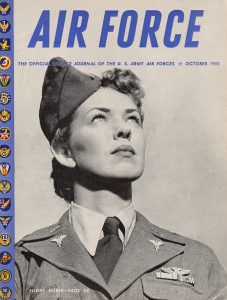Meet the former US Army flight nurses whom I interviewed for
Beyond the Call of Duty: Army Flight Nursing in World War II.
In 1986 as part of my research about flight nurse history and coping with war, I was privileged to interview 25 former US Army nurses about events of their flight nurse duty in World War II. Most of them are now deceased, but their stories live on in Beyond the Call of Duty: Army Flight Nursing in World War II.
The journal I kept of my time with each of them in 1986 when writing my dissertation offers a brief personal glimpse of these remarkable women. I am sharing edited versions of these journals, in the order in which the interviews took place. The actual interviews are in separate documents.
20th Interview
Brooxie Mowery Unick
816 MAES Europe
25 May 1986
My interview with Brooxie was the last interview I conducted at the World War II Flight Nurses Reunion at Cocoa Beach, Florida. I had asked Brooxie about the interview when she jokingly remarked that, since she couldn’t get her flight home changed from later in the week to Sunday, she was going to sit in her room on Monday and sulk. I suggested that perhaps if she were willing, we could do an interview and help pass the time on that day. Brooxie readily agreed. Some of the members of Brooxie’s 816 MAES who were attending the reunion, however, suggested she join them for a short visit in Tequesta, Florida. Brooxie therefore was leaving for Tequesta shortly after checking out of the hotel at noon.
When I realized how rushed an interview with Brooxie would be, I offered to cancel the interview so that she could get on the road a bit sooner. But Brooxie still wanted to be interviewed, so I did some quick planning to facilitate both the interview and Brooxie’s trip. I suggested that Brooxie drive to Ethel Cerasale’s house in Satellite Beach, which was on the way to Tequesta. Ethel had invited several of us to stop by, including Agnes Mangerich and me, and I knew Brooxie would be welcome too. I then conducted the interview at Ethel’s house.
Brooxie was pleasant and willing to be interviewed, but although she had shared many experiences with her World War II colleagues at the reunion, she did not have much to say. It was not because she was uncomfortable being interviewed; rather, she commented that she was not one to live in the past. Unlike some women I’ve interviewed, Brooxie didn’t reminisce, remembering long-forgotten memories. I found that in order to keep Brooxie talking, I needed to ask more questions than usual.
I asked, for example if Brooxie’s training in nursing school and at Bowman Field had prepared her for flight nurse duties. In small ways, she said, but it didn’t always work out. For example, the flight nurses were told that they would fly with an enlisted technician, but that seldom happened—the flight nurse was often the sole attendant. They were taught how to arrange litters to facilitate patient care, but in a wartime scenario, time often didn’t permit careful placement of patients. On one flight a patient with a serious head wound was in a top litter and became agitated. Brooxie had to call the aircrew members to come hold him down. She eventually asked that the plane be diverted so that the patient could receive medical attention. What was taught in theory didn’t always work out in practice.
When I felt Brooxie had run out of things to say, I chose to end the interview. Brooxie needed to get on the road to Tequesta, and her comment when she looked at her watch told me I’d made a wise decision. Brooxie remembered the fun things about the war as opposed to the bad things. I hope her memories will add another perspective to the concept of coping with war. My interview with Brooxie helped me realize that some days of a reunion are better than others for an interview, and the final day of the reunion was not conducive to a lengthy interview designed to elicit particular information for my dissertation.
One of Brooxie’s stories: Brooxie remembers that her squadron was not involved in air evacuation before D-day. To keep them busy during that time, flight nurses were sent, usually in twos, to bomber bases to become familiar with the B-17s and B-24s in the event that, in an emergency, they needed to use the plane for air evacuation. Brooxie went to a B-24 base, where she attended early-morning pre-departure briefings on the flight line, then helped out at the base hospital. She returned to the flight line to watch the planes return, and after the aircrews were debriefed, the flight nurses gave crewmembers a shot of whiskey. Brooxie said it was the nurses as well as the whiskey that gave the men a lift. “I mean, they’d reach for the glass, and it was kind of a double take when they saw who was there.”
Brooxie died in 2005.



